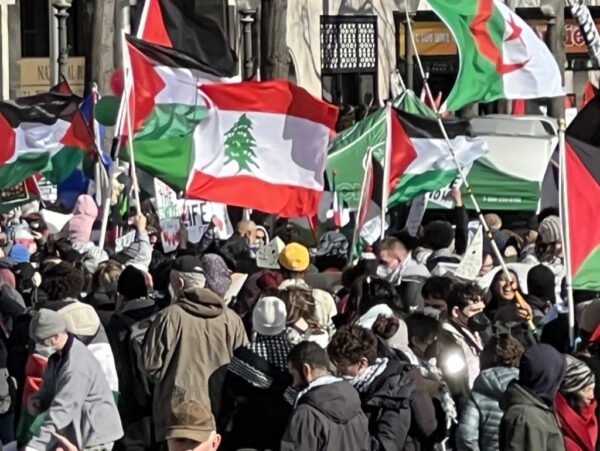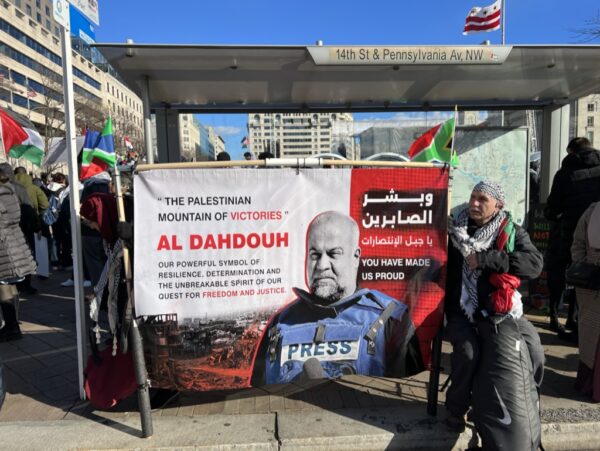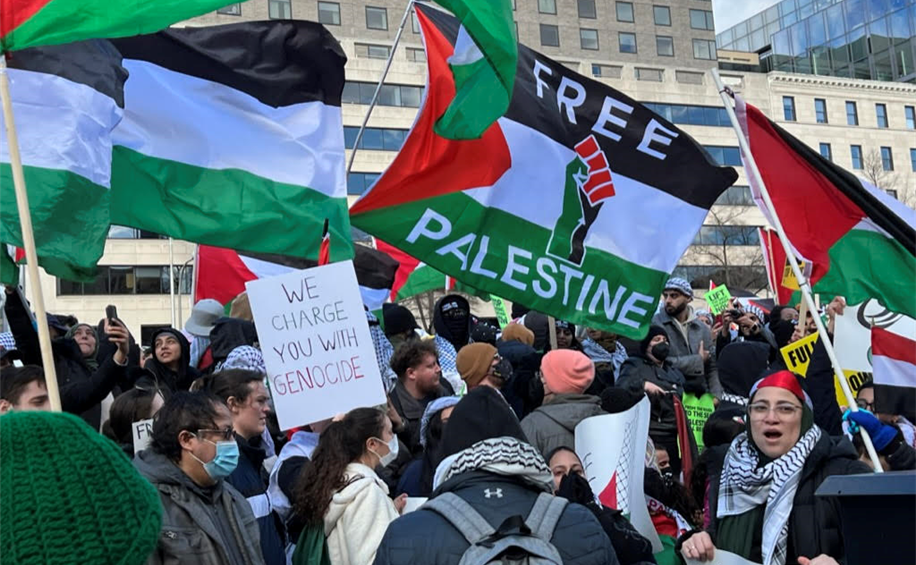As the world watches the dystopian horror movie in Gaza unfolding on social and traditional media, U.S. news networks are giving more attention this week to the Hollywood awards season. As South Africa makes the case against Israel’s genocide at the International Court of Justice, U.S. media in its dwindling coverage is relying on reporters and pundits still using gentle euphemisms like “conflict” while other words are skewed in translation.
Before we get to the word “genocide,” let’s consider “Hamas,” which is often misused as a synonym for Palestine and Gaza, as in “Israel-Hamas War,” minimizing that nearly everyone targeted and being killed is a Palestinian human, not a member of Hamas. In Arabic, Hamas is an acronym that stands for Islamic Resistance Movement ( حركة المقاومة الإسلامية). It is often referred as “Iran-backed” without mentioning Israel supporting the inception of Hamas in the late 1980s. This was during first Intifada (which means uprising in Arabic, but is now associated with the unarmed Palestinian grassroots rebellion against the Israeli occupation between 1987 and 1993), when Israel’s goal in supporting Hamas was to break the unshakeable Palestinian identity and replace it with an ancient battle between Islam and Judaism, a struggle that never existed.
Today the result of this investment is known as “October 7,” as if all days before and after are trivial. For example, October 17, the day an explosion in Al Ahli Baptist Hospital killed 500 people while hundreds in Gaza died elsewhere, is not a proper noun, nor are the many other massacres Palestinians have endured over the decades.
Israel has positioned October 7 as a synonym for antisemitism. The word Semite was introduced by 19th century Western academics who studied mostly dead languages: They named a group of languages from Southwest Asia and Africa as “semitic” languages, including Aramaic, Arabic and Ancient Hebrew. It was a somewhat arbitrary grouping, but this was the European colonial era, a time when geographical, racial and ethnic categorizing was a pastime of conquering and dividing.
The word antisemitism was introduced by German Wilhelm Marr, who saw Jews as a threat to Europe and established the League of Antisemites in the 1860s. His word choice is also somewhat arbitrary since European Jews did not speak ancient Hebrew and modern Hebrew was in its infancy.
Some Palestinians point out that they are semites, as speakers of Arabic, so how can they be antisemitic, but this is frivolous. The Palestinian story has nothing to do with an ancient language department in European academia.
Marr’s antisemitism would be foundational to the Holocaust. A government-orchestrated mass killing of a people is also known as genocide, a word coined by Polish Jewish legal scholar Rafael Lemkin in 1944 when documenting Nazi atrocities.
“Genocide does not necessarily mean the immediate destruction of a nation … It is intended rather to signify a coordinated plan of different actions aiming at the destruction of the essential foundation for the life of national groups, with the aim of annihilating the groups themselves,” Lemkin wrote in “Axis Rule in Occupied Europe.”
In Arabic, the word for genocide translates roughly into “mass extermination of humans.” Gaza is ideal for this: As one of the most densely populated places on the planet, everyone is a de facto “human shield” in any bombing campaign, including when Israel says it’s kindly giving them a warning to “move,” a word the implies there is somewhere else to go.
If you Google Translate “antisemitism” into Arabic, you get back the literal translation ( معاداة السامي), as Arabic does not have a word for a hatred of Jews. While English has no common word that refers to a hatred of Christians, it has one that refers to a hatred of Muslims. The word Islamophobia was first used by Swedish painter and writer Ivan Aguéli in an article published in Il Convito/Al-Nadi in 1904 as a critique of Europeans stereotypes of Islam. Likening Hamas’ attack to the western problem of antisemitism plays into Islamophobia.
Notably, in Arabic, the word for holocaust is محرقة and for the Jewish Holocaust محرقة يهود أوروبا “holocaust of European Jews.” Before Israel, there were some Palestinian Jews (around 5%) but they were not persecuted people, nor were the Palestinians of any faith responsible for violence against Jews anywhere in the world.
Calling Israelis or Palestinians “Nazis” is assuming that we need European words in order to put value on something happening somewhere else. “Nazi” also fuels European guilt and creates an “it’s complicated” reaction for the West. For Palestinians, however, it’s simple: In 1948, a group of Zionists, with the support of the very Europeans that subjected them to centuries of antisemitism, were granted through the newly formed U.N. a Jewish state in historical Palestine, then a British colony. No one provided a logical answer where the indigenous people, the Palestinians, were supposed to go — or why they had to go at all.

Demonstrators at Washington D.C. rally for Palestine on January 13. Photo by Alia Yunis.
Over the decades, as Jews from all parts of the world were welcomed with enticing benefits, the dismissal of this question has left Palestinians enduring bombardments, imprisonment, separation walls, lockdowns, random invasions of their houses, checkpoints, burning of their crops, unemployment. They live in cage-like conditions, not an “open air prison,” a phrase that implies that they are guilty of something when their only crime is being born on the same land as their ancestors. Some supporters of Palestinian rights refer to Gaza as a “concentration camp,” using a Western reference to give the Palestinian tragedy weight.
But these phrases — and Hamas itself — wouldn’t exist if there were equal rights for Palestinians and Israelis. We call this lack of equality “the occupation,” a softening of the Western word for what it is: colonialization. When Europeans resettle a piece of land as theirs, that is colonization. Zionists claim an historical connection to this land, but so, too, can Christians and Muslims, never mind Assyrians, Egyptians, Persians, and Romans and the many others who have lived amongst its indigenous people over the centuries.
The framing of it as a place where people of only one demographic group are allowed to live — whether you consider the Jewish people a nation or a religion — goes against thousands of years of this land’s history. It is also called “ethnic cleansing,” a phrase introduced when describing the mass displacement and deaths during the Bosnian War (1992-95).
This land has always been the nexus for many trade and pilgrimage routes, so it has always attracted a plurality of people. Western powers today have consolidated around the Zionist narrative not only because of collective shame but also to safeguard their remaining outpost in post-colonial world.
As for “from the river to the sea,” it is a phrase has been used in some form or another from more than a couple millennia to describe Palestine. In the 5th century BCE, the Greek “father of history,” Herodotus wrote of a “district of Syria, called Palestine” between Phoenicia and Egypt. In the 1917 Balfour Declaration, the British Foreign Secretary, Lord Balfour, confirmed that historical Palestine would be given to Britain’s Jewish subjects as “a national home … it being clearly understood that nothing shall be done which may prejudice the civil and religious rights of existing non-Jewish communities in Palestine.” But Netanyahu’s Likud Party has not changed its 1977 charter’s “between the Sea and the Jordan there will only be Israeli sovereignty.”
To most protestors, the chant means Palestinian families forced into refugee camps during the 1948 nakba (the Arabic word for catastrophe), including thousands now in Gaza, have the right to live alongside Israelis, either in a one state or two state solution.
This is not simply solved by an absurdist phrase like “humanitarian corridor”: To frame Palestinians as impoverished victims who only need food and medicine in between bombings doesn’t acknowledge them as a culture that, despite all obstacles, continues to produce scientists and artists. When only framing Palestinians through humanitarian needs, the media makes them a “problem” that needs a “solution,” which sounds eerily familiar to European history.
Nor is it solved by singing John Lennon’s protest cliché “Give Peace a Chance.” Peace implies an end to a war, but this is not a “war.” I’ll again refer to a European source, Encyclopedia Britannica: “Military writers usually confine the term to hostilities in which the contending groups are sufficiently equal in power to render the outcome uncertain for a time. Armed conflicts of powerful states … with internal groups are rebellions or insurrections.”

Demonstrator holds sign applauding Palestinian journalist
Wael Al-Dahdouh at Washington D.C. rally on January 13. Photo by Alia Yunis.
The longer Israel, endowed with unequivocal power through Western support, has “right to defend itself,” i.e., violently eliminate a people, the harder it pushes to establish no difference between antisemitism and Zionism, so also it diminishes the difference between a terrorist and a nation state. The word “terrorism” has become an Islamophobic word adopted in the West to describe any violence by Muslims, but it originates in Europe during France’s “reign of terror” in 1793 when the ruling Jacobins executed anyone considered a threat to their rule.
Palestine is in a part of the world that did not have nation states until European colonizers carved them up into such in the 20th century. The nation state concept developed in the 1600s in Europe, at the sunrise of its colonial era. Maybe it’s time to have a new definition of a nation state — or rather consider being a “civilization” defined by the Oxford Dictionary as “the process by which a society or place reaches an advanced stage of social and cultural development and organization.” A civilizing mission of a different sort, a land where people can pursue, to use a currently fashionable expression, “their best selves” as individuals, not as flag wavers.
When people call Israel an apartheid state, it is worth remembering that apartheid did not end in South Africa with a two-state solution. A one-state solution has now been positioned as New Age jargon, but it is something that has been studied as physically possible for all. Watching black and white legal scholars represent South Africa make their case together is further proof of this.
Perhaps nothing makes one shudder more than the use of the word “rape” to detract from the actual situation in Gaza. It diminishes and fetishizes all the women in the world, including the victims of Hamas, by using this most of serious of crimes as a shield and deflection from Israel’s own crimes, which over the 75 years have also involved rape and sexual abuse, including amongst its own soldiers.
Images coming out of Gaza and the West Bank are marked as “sensitive content,” which seems to mean scrollers might not want to disturb themselves with the suffering of others lest they are forced to reconsider their vocabulary — or disturb their own good times. Well into January, I still see Christmas decorations up in the U.S., even though Christmas was cancelled months ago in Jesus’ birthplace, Palestine. Some say Jesus was born a Jew, some say Jesus was Palestinian. Both are correct. What does that tell you about the plurality this place is meant to have?
Alia Yunis has worked as a filmmaker and writer in many parts of the world. Her feature documentary, “The Golden Harvest,” recently toured film festivals. Her fiction, including “The Night Counter” (Random House), and non-fiction writings have appeared in numerous books, magazines and anthologies and have been translated into eight languages.
Header image of demonstrators in Washington D.C. by Alia Yunis.

